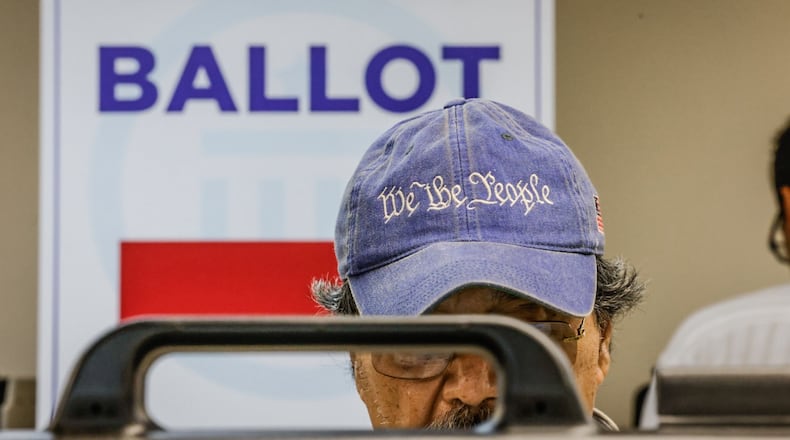“We’re extremely pleased with the decision of the Supreme Court,” said Montgomery County Board of Elections Director Jeff Rezabek. “It ordered us to do what we are already doing.”
The complaint, filed last month, alleges that Dayton resident and election volunteer Marcell Strbich, among others in his class, wasn’t trained to identify photo ID cards issued to noncitizens.
Ohio Secretary of State Frank LaRose issued a directive in June asking county election officials to include lessons on how to verify a voter’s identity with a photo ID card and how to ensure that “only legally permissible forms of photo ID are accepted.”
When Ohio’s updated voter ID law went into effect last year, the Ohio Bureau of Motor Vehicles added a noncitizen label to the back of Ohio driver’s licenses and state IDs given to immigrants.
Strbich attended a pollworker training course on Sept. 25. The class he attended was for returning pollworker volunteers, although Strbich was a first-time volunteer in Montgomery County, according to an affidavit drafted by Rezabek.
At the time of the complaint filing, Rezabek told the Dayton Daily News that his office was complying with the state’s directive.
Strbich told the Dayton Daily News that his trainer did not go over the non-citizen designation on the back of ID cards during his class, nor did the instructor have any slides about noncitizen identification in his presentation to the class.
Rezabek in court records states he also attended the end of Strbich’s class to take questions from volunteers, and Strbich did not ask any questions of him at that time. After class, Strbich’s instructor relayed to Rezabek that Strbich asked a question about citizenship and documents.
Rezabek and his team reviewed their training materials and contacted the Ohio Secretary of State’s Office, which provides the content for slide presentations and supplemental training documents used to train pollworkers in Montgomery County. Information regarding noncitizenship and identification was added to the curriculum for the other poll worker training class scheduled for Sept. 25, according to court documents.
“Within hours of the issue being raised, the new slides enhanced the New and Returning PEO training class presentations,” Rezabek wrote in his affidavit to the court.
Rezabek said that his staff reviews training courses regularly, and when new information is added to the curriculum, emails are sent to all volunteers with the up-to-date information. The election board director in his affidavit said emails will be sent out to all volunteers who took training classes before the evening course on Sept. 25.
Rezabek said that neither he nor any other election board leader received calls from Strbich or other volunteers who provided testimony in his complaint.
“It is absolutely disappointing that if you’re going to be the self-proclaimed integrity police for elections, that you can’t even talk to any of the directors,” Rezabek told the Dayton Daily News. “They wanted their 15 seconds of fame. But they’re not about protecting the election. They’re about themselves. And that’s what’s extremely disappointing about this case because we wasted time, effort and resources that we could be spending on the election, dealing with this comical filing.”
In a statement to Dayton Daily News, Strbich said he was grateful for the Ohio Supreme Court’s decision.
“Ohioans’ insistence on election administration accountability, transparency and oversight will continue in an effort to restore full confidence in election administration for all Ohioans,” Strbich said.
Strbich previously voiced concern about election security on the Ohio Statehouse floor. This spring he gave testimony in favor of Ohio House Bill 472. The bill — sponsored by State Reps. Bernie Willis, R-Springfield, and Bob Peterson, R-Sabina — proposes sweeping changes to Ohio’s elections, notably allowing counties to choose to switch to hand-counting paper ballots instead of using voting machines or automatic tabulating equipment.
About the Author

